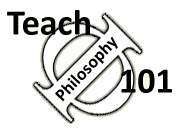Teach Philosophy 101
Free resources for
philosophy teachers!
"One of the most comprehensive, well-researched, and accessible guides for teachers that I have ever seen." James Lang, Chronicle of Higher Education (read full review of TΦ101)
Generational Differences
We’ve heard a about the characteristics of the various generations, such as the “baby-boom” and the “greatest generation.” The students who are now going to college -- born in the mid-to-late 1990s – are sometimes called "Millenials" or “Generation Y.” Actually there are 65 million people in this age group, about the same number as the aging boomers. The parents of these students can present their own challenges. A fascinating YouTube video (now even a bit dated, having been posted in the dark ages of 2007!), created by students, gives a view of how they see higher education.
Environment of Millenial students
Very different from previous generations because of:
-
Heavy exposure to media
-
Taking technology for granted
-
Accustomed to instant gratification through cell phones for communication, Internet for information, video games for amusement, and Facebook, Snapchat, Twitter, etc. for socializing
Challenges
More skeptical of authority
-
More narcissistic (one study reports 30% increase compared to college students in 1982)
-
Spend less time on homework compared to previous generations and students from other countries
-
Expect rewards to be distributed to all rather than to those who have merited recognition for their accomplishments
-
Consumerist attitudes, expect others to cater to them rather than vice versa
Strengths
-
Creative
-
Techno savvy, good at multi-tasking
-
Energetic, leading “executive” life styles, constantly on the go with activities, work, classes
-
Committed to volunteerism (if not to politics)
Recommended teaching strategies
These students sometimes respond best to:
-
Learning by doing
-
Active learning, debates, role plays, using technology
-
Connections to real world and to benefits for the students themselves
-
Individuality and flexibility, these students react poorly to “one-size all” teaching assignments
-
Frequent feedback, students respond better to weekly quizzes.
Source: Above material is summarized and paraphrased from Jim Westerman, Motivating Generation Y in the Classroom, Teaching Excellence 18: 5 (2006-2007).
See also Beloit College's annual Mindset List, which describes key features of the world, as it has appeared to incoming classes of first-year college students.
Resources:
For a good introduction to the mindset of each new freshman class, check out the hilarious Beloit College site, where you will learn, among other things, that today's freshmen have grown up with bottle water and civilian Humvees; expressions such as "dial" and "off the hook" have never had anything to do with physical hooks or dials.
Sharmila Pixy Ferris (William Patterson University) gave an interesting presentation on this topic at the 2009 Lilly-East conference. She graciously made her slides available to TΦ101.
Oblinger, D.S., and J.L. Oblinger (eds,) Educationing the Net Generation. Boulder, CO: Educase (2005). This book length anthology is entirely available on the Internet and deals with a variety of topics concerning the new generation of students.
Author: John Immerwahr
Update: 15 Dec. 2015 (E. Tarver)
